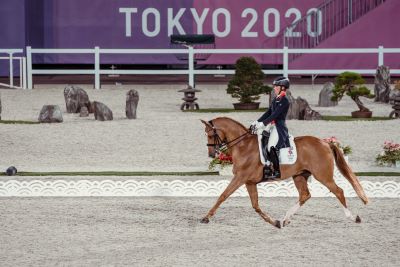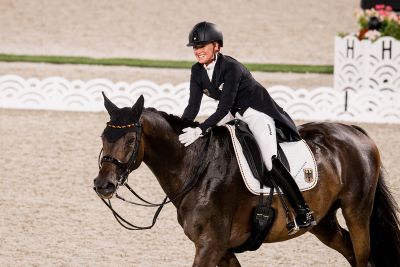Jessica von Bredow-Werndl. (FEI/Shannon Brinkman)
Everything about the Tokyo 2020 Olympic Games has been a journey into the unknown. But there was a ring of familiarity combined with a spirit of great sport when Germany’s Jessica von Bredow-Werndl claimed the Individual Dressage title with the lovely mare TSF Dalera at Baji Koen Equestrian Park where compatriot Isabell Werth had to settle for silver and Great Britain’s Charlotte Dujardin took the bronze. It was the perfect end to four fabulous days of competition in this first of the three Olympic equestrian disciplines.
The new champion was always on song, throwing down the biggest score in the opening Grand Prix and then setting a new Olympic record in the Grand Prix Special to secure the team title for her country. She produced another performance that oozed such class and elegance that once she left the arena, with a score of 91.732 on the board, it seemed impossible she could be beaten.
But the game is never over until it’s over, and the tension and emotions in the closing stages were extreme. Of four remaining combinations still left to take their turn, three of them were a real threat, and as she was trying to engage in a post-competition media interview, von Bredow-Werndl’s eyes were glued to the nearby screen, because, third-last to go, her compatriot Isabell Werth was in the ring.
Longtime legend
Werth is a longtime legend with more Championships and Olympic medals in her trophy cabin than any other equestrian athlete. Never the shrinking violet, she is not used to playing second fiddle to her own team-mates and with her much-loved mare Bella Rose, she produced one of her typically spellbinding performances that kept onlookers glued to every move. However, when her score of 89.675 was posted, von Bredow-Werndl burst into tears and fled back to the stables, overcome by the possibility that Olympic gold was now within reach.
Second-last to go was defending double Olympic champion Charlotte Dujardin from Great Britain, but not with the now-retired superstar Valegro with whom she dominated the sport in recent years, but instead with a 10-year-old gelding who knows nothing about the world.
Von Bredow-Werndl’s mare took team gold at the FEI World Equestrian Games in Tryon, USA in 2018 and individual bronze at the European Championships in Rotterdam, The Netherlands the following year. Werth’s mare is a veteran of two World Championships in which she medalled and also those Europeans where she also took gold. On the other hand, Dujardin’s little chestnut, Gio, had previously only ever competed at one international show, at Hagen in Germany in April. Unaware of the level of exposure he was now getting, however, the little chestnut gave his all for a score of 88.543, which put him in bronze medal position.
Only the last of the German riders, Dorothee Schneider, could change the podium places now and under normal circumstances she might well have ensured it was an all-German one, but it didn’t happen when her horse, Showtime, was right off form.
Spectacular
Talking about the spectacular ride she enjoyed on Dalera that earned the coveted gold, von Bredow-Werndl said, “I felt from the very first second to the last that she was 100% with me – listening so well that I had to be careful not to do too much or too little!” She’s been riding the 14-year-old mare for many years now, but she’s had a new level of belief in their potential since producing a great performance at the 2019 European Championships.
“We didn’t have such a lucky start in the Grand Prix or the Special there, but in the Freestyle, we showed that anything is possible and from then on I began believing the Olympic dream could come true.” Now it has…
Meanwhile, silver medallist Werth was asked what it was like to no longer be the number one German rider, and replied with her usual wisdom. “If you follow the results of the last 30 years, I have not always been number one; it has been up and down all the time and I’m happy today because Bella felt fantastic. This was a tough sporting competition and that’s what we all want to have and love to have. You can’t have ten winners; you can only have one – that is sport,” she pointed out.
Dujardin, in the meantime, who in winning her sixth medal has overtaken rower Dame Katherine Grainger to become Great Britain’s most decorated female Olympian of all time, was delighted with her bronze. And she was thrilled with her little wonder horse.
“I was never going down without a fight, but Pumpkin (Gio) has only done one other Freestyle in his life and for him to go out there with as little experience as he has is truly outstanding. We never did this floorplan before and he didn’t know what he was doing, and I didn’t know what I was doing, but we just went out to have a really good time and enjoy ourselves, and we did that. I’m really proud of him,” she said.
Facts and Figures:
The Individual silver in the Freestyle has brought the total number of Olympic medals won by Germany’s Isabell Werth to 12. She has won 6 team golds, 1 individual gold and 5 individual silver medals, going all the way back to the Olympic Games in Barcelona in 1992.
Werth was the last German rider to take the Individual Olympic title, with Gigolo at the 1996 Games in Atlanta, USA.
Quotes:
Jessica von Bredow-Werndl GER (Gold): “I was so nervous when Isabell rode… when I heard her result, I just had to cry… it was very emotional.”
Charlotte Dujardin GBR (Bronze): “My journey with Valegro was a life-changing experience and to find another Valegro is near enough impossible. But I’m incredibly proud to have another horse here at the Olympic Games that I bought as a 5-year-old, trained him up and took two medals here – it’s incredible to achieve that.
“Coming here we really didn’t know what to expect. Gio is a horse with very little experience; that is only the second Freestyle he’s ever done. To come to each Olympics and medal team and individually every time – I did it twice with Valegro and to come with a new dance partner, very inexperienced and very young, and come away with two medals again – I couldn’t be prouder!”
Sabine Schut-Kery USA, who finished fifth, when asked how it feels to have become an overnight sensation due to her performances with Sanceo: “It makes me a little bit like I want to crawl into a hole! I don’t really know what to do with it.”
Sabine Schut-Kery USA, when asked about her horse’s performance and her accompanying musical score: “Sometimes they have an extra little edge and maybe that wasn’t quite there tonight, and because I wasn’t as polished in the floorplan because I hadn’t ridden it, I think I was not as fluid and I was in his way. He was not tired he was just a little more edgy the other two nights.”
About her music: “It was created by my husband Kristian Kery. The first song is from the movie The Last Samurai and I just love it because I think movie music is meant to bring certain emotion to you, so I love that style of music – it resembles Sanceo, a little bit dramatic but not too much!”
Results here.
by Louise Parkes
Media contacts:
Grania Willis
Executive Advisor
grania.willis@fei.org
+41 78 750 61 42
Olivia Robinson
Director, Communications
olivia.robinson@fei.org
+41 78 750 61 35
Shannon Gibbons
Manager, Media Relations & Media Operations
shannon.gibbons@fei.org
+41 78 750 61 46+





